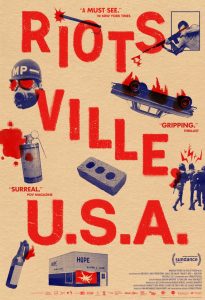
“Riotsville, U.S.A.”
(USA)
Metacritic (5/10), Letterboxd (2.5/5), Imdb.com (5/10)
It’s unfortunate when a film has an important message to convey but does a poor job of saying what it has to say. That’s the problem with this documentary about the policies and practices underlying government efforts to control violent civil disobedience in major US cities during the mid to late 1960s. It focuses on the training programs employed at US Army bases where model cities (called “Riotsville”) were built to stage simulated disturbances used for instructing military and police forces on how to quell such outbreaks in line with official government policies. But the film goes beyond that, trying to explain why these incidents were occurring with increasing frequency at the time and why such extensive training measures had become necessary. In doing so, the picture examines the frustrations associated with, and subsequent reactions to, the issues of poverty, racism, police brutality, inequality and the impact of the Vietnam War, among others, principally in minority inner city communities. It tells this story using only archive footage from the time, drawn from television broadcasts and official US military training films. However, given the broad scope of this story, director Sierra Pettengill’s third feature outing doesn’t delve nearly deep enough into these issues, somewhat surprising given the wealth of material at the filmmaker’s disposal. Nor does it tie the Riotsville project to these larger questions as well as it could, relying more on implication than connection. Moreover, this shallow, underdeveloped approach is further undercut by a number of poorly chosen video segments and others in desperate need of editing out extraneous content. Add to that far too many explanatory subtitles and a number of dull, overwritten voiceovers seeking to philosophically elaborate on its conclusions, and you’ve got a watered down presentation of material deserving to be delivered with a greater sense of hard-hitting urgency. This is the sort of film that should make audiences angry, not put them to sleep, but this offering does more to promote the latter than the former. This is a story that would have been better told through more skillful directorial hands for it to have the impact it requires. Unfortunately, that’s not the case here.




Leave A Comment